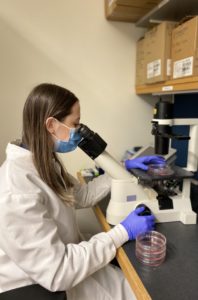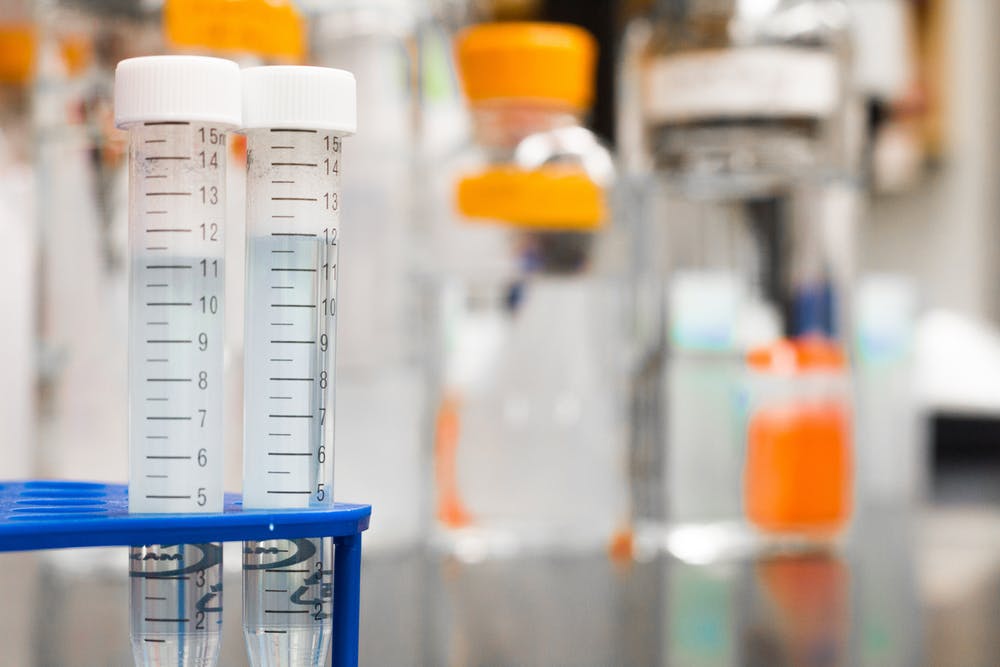What is your major?
I’m a third-year cell and molecular biology major on a pre-med track with a minor in business administration. I am currently a CaNCURE Research Assistant co-op at Brigham and Women’s Hospital.
What inspired you to pursue this combination of studies? What career do you hope to pursue when you graduate?
I’ve always had an interest in biology, particularly at the cell and molecular levels. I’m constantly amazed by all the processes that take place beneath the surface, and a desire to learn more about them led me to pursue a specialized major in cell and molecular biology. I also felt that having a background in cell and molecular biology would prepare me well for a future career in medicine. Once I graduate, my goal is to attend medical school and receive an M.D./M.B.A. Healthcare at its core is a business, and understanding business can help physicians bring forth systemic change. With the knowledge that I eventually wanted to pursue an M.B.A., I decided to minor in business administration to gain exposure to different areas in business. At Northeastern, I have developed a passion for women’s health, and I hope to tie this into my future endeavors.
How has this combination of studies enhanced your experience at Northeastern University?
An emphasis on interdisciplinary education is part of what attracted me to Northeastern. Having taken classes in science and business has made me a more well-rounded student. I’ve learned specific skills through science, such as critical thinking, data analysis, and creativity, that translate well to business. Likewise, in business, you learn teamwork, communication, and the art of persuasion, all of which apply to science. Science and business are both based on principles, but business requires more introspective thinking, whereas science is objective. I like that the two subjects have their differences, but I’m particularly interested in how they intersect, especially in fields like medicine. Minoring in business has also opened up new opportunities for me to research and meet new people.
Tell us about your current co-op at the Dinulescu Lab at Brigham & Women’s Hospital.
This semester I was on co-op as a CaNCURE Research Assistant at Brigham and Women’s Hospital. CaNCURE is an NIH-funded undergraduate research program for cancer nanomedicine affiliated with Northeastern and the Dana-Farber/Harvard Cancer Center. I work specifically in the Dinulescu Lab, which focuses on identifying biomarkers for the early detection of ovarian cancer and developing novel targeted therapies. In collaboration with the Sridhar Lab at Northeastern, I’m studying the efficacy of sustained PARP inhibitor (PARPi) release via a biodegradable implant in preventing ovarian cancer development in vivo. In addition, I have been writing a literature review on the racial/ethnic and socioeconomic disparities that persist in BRCA genetic screening and risk-reducing surgery for breast and ovarian cancer.
Tell us about your experiences outside of co-op.
Outside of co-op, I’m involved in several organizations on campus, such as the TriBeta Biological Honor Society, Alpha Epsilon Delta Health Pre-Professional Honor Society, College of Science Peer Ambassador Program, and my sorority Alpha Epsilon Phi. I also serve in a few leadership capacities as the Secretary of TriBeta and the VP of Community Service for Alpha Epsilon Phi.
I often volunteer in the Greater Boston area through Northeastern Mutual Aid, the Boston Bruins Foundation, and the Center for STEM Education. I first became involved in volunteering in high school and have loved it ever since. I find that community service volunteering is a great way to connect with peers and members of the community, in addition to being incredibly rewarding. For those interested in getting involved in community service, the Northeastern Center for Community Service and VolunteerMatch are helpful resources for finding opportunities.
Tell us about your previous experiences during your time at Northeastern.
Recently, I worked as a remote research assistant at the D’Amore-McKim School of Business. In my role, I collected and analyzed data on the demographic makeup of executive boards of biotech/pharmaceutical companies.
Before that, I participated in the College of Science Scholars Program and the Sigma Xi Scientific Research Honor Society Immerse Program. In the Scholars Program, I served as the project lead for my group which created a value-based care report for new technology capable of detecting female-prevalent diseases developed by LifeStory Health Inc.
In the Sigma Xi Immerse Program, I presented a literature review on the efficacy of oogonial stem cells in the preservation and restoration of female fertility at the 2020 Research, Innovation, Scholarship and Entrepreneurial Expo.
How do these clubs and organizations enhance your overall experiences at Northeastern?
Being a part of different clubs and organizations provides a nice break from classes and an opportunity to learn more about things I’m interested in. It’s also an opportunity to socialize and meet new people. I’ve met many of my friends through organizations I belong to, especially my sorority, and having that kind of support system can be very empowering. Furthermore, taking on leadership roles has allowed me to achieve personal and professional growth. Being in these positions has helped me become more extroverted, communicative, organized, and confident in myself.
You’re doing a lot; how do you balance everything and find time for yourself?
It’s important to recognize and communicate your limitations. Being able to say no can ensure that you have the time and energy to tackle the responsibilities you already have and save you from burnout. It’s also important to set aside time for yourself. Now that I’m on co-op, I try not to bring work home unless necessary. In the case that I do, I prioritize my mental and physical health by allowing myself time to eat, workout, sleep, etc. Time management is a valuable skill to have, and I find it helpful to write down all my tasks, assignments, and club meetings in Google Calendar and Google Keep. Visualizing my schedule for the week allows me to plan my time effectively.
What are your plans for the spring semester?
This spring, I will be back in classes that I’m excited to have in-person again and apply for my second co-op. I will continue to work in the Dinulescu Lab per diem and will hopefully begin working as a Health Equity Intern at the NU Institute for Health Equity and Social Justice Research.

